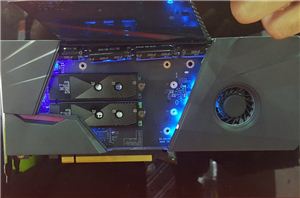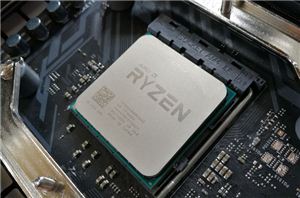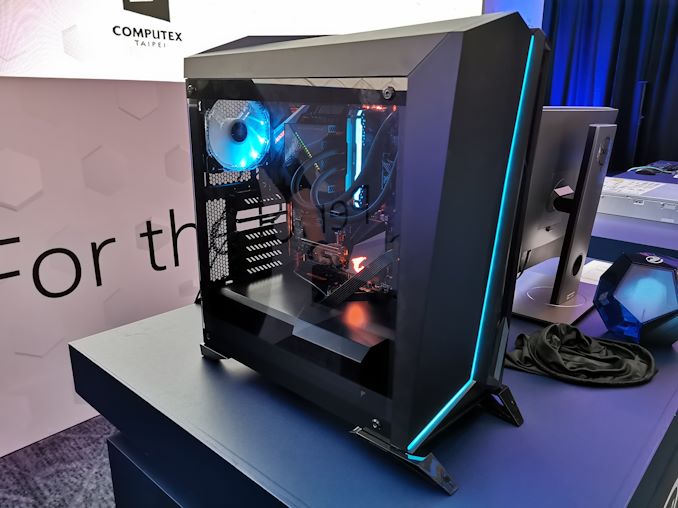Intel Announces 8 Core i9-9900KS: Every Core at 5.0 GHz, All The Time
by Ian Cutress on May 26, 2019 11:00 AM EST
Last year, Intel showcased a CPU during its keynote a processor with all of its cores at 5 GHz. Today, that becomes a reality – Intel is set to launch a processor that promises that frequency in any scenario. The new Core i9-9900KS is an 8-core processor that will run at 5.0 GHz during single core workloads and multi-core workloads.
That demo last year was on an overclockable 28-core Xeon CPU, but in reality was clocked way lower. There was even a good amount of controversy, as Intel didn’t state at the time they were using a sub-zero chiller to achieve that result. But this year we’re getting something a little more realistic. The new Core i9-9900KS uses the same silicon currently in the i9-9900K, but selectively binned in order to achieve 5.0 GHz on every core, all of the time.
Technically the CPU has a base frequency of 4.0 GHz, however it will only ever go down to that amount based on a default Intel BIOS (no consumer board uses the base BIOS specifications). The new CPU will be enabled in the same motherboards as the Core i9-9900K, but with a small firmware update. The CPU also has the same integrated graphics as the Core i9-9900K.
Intel did not tell us the TDP yet, but we will update this article when we know. Pricing and the launch date are also an unknown, however Intel SVP and GM Gregory Bryant is running a keynote here at Computex in a couple of days, and we expect to have the details then.
Update 05/28: As part of his Computex keynote, Gregory Bryant has confirmed that the processor is launching in Q4 of this year. Pricing and TDP will presumably be announced much closer to the actual launch.
| Intel 9th Gen Core 8-Core Desktop CPUs | ||||||||
| AnandTech | Cores | Base Freq |
All-Core Turbo | Single Core Turbo Freq |
IGP | DDR4 | TDP | Price (1ku) |
| i9-9900KS | 8 / 16 | 4.0 GHz | 5.0 GHz | 5.0 GHz | UHD 630 | 2666 | ? | ? |
| i9-9900K | 8 / 16 | 3.6 GHz | 4.7 GHz | 5.0 GHz | UHD 630 | 2666 | 95 W | $488 |
| i9-9900KF | 8 / 16 | 3.6 GHz | 4.7 GHz | 5.0 GHz | - | 2666 | 95 W | $488 |
| i7-9700K | 8 / 8 | 3.6 GHz | 4.6 GHz | 4.9 GHz | UHD 630 | 2666 | 95 W | $374 |
| i7-9700KF | 8 / 8 | 3.6 GHz | 4.6 GHz | 4.9 GHz | - | 2666 | 95 W | $374 |
The main difference compared to the Core i9-9900K is currently that all-core turbo value, which is a flat 5.0 GHz, a 300 MHz increase. There's a slight chance Intel might have increased the TDP, especially given that the base frequency (which TDP is built on) has increased 10% from 3.6 GHz to 4.0 GHz.
Why Intel Processors Draw More Power Than Expected: TDP and Turbo Explained
Intel did have a demo system for us to look at, which used a standard off-the-shelf motherboard and a closed loop liquid cooler. Intel confirmed that the chip is soldered, and that this is just simply the same silicon as the 9900K but better binned.
More info in a couple of days.
| Want to keep up to date with all of our Computex 2019 Coverage? | ||||||
 Laptops |
 Hardware |
 Chips |
||||
| Follow AnandTech's breaking news here! | ||||||











136 Comments
View All Comments
Opencg - Sunday, May 26, 2019 - link
Keep worrying about zombieland the exploit that means your system was already compromised. Lol these side channel attacks mean nothing unless you run virtual machines your system would already have been owned.Peter2k - Wednesday, May 29, 2019 - link
The patches and the perfomane hit they bring are distributed universally thoughthrough windows update for instance, or a new UEFI
So sure, as a gamer I don't worry about frankly all those side channel attacks, the the patched perfomance hit is for everyone, no matter the risk
mode_13h - Wednesday, May 29, 2019 - link
It's one thing to be misinformed, but you really shouldn't spread that nonsense around.mode_13h - Wednesday, May 29, 2019 - link
Recent side-channel exploits don't have anything to do with VMs, except that they create chinks in the armor of even these fortresses once thought to be impenetrable.Put another way, if one VM can be penetrated from another, just how secure do you think a process or the OS kernel is?
Krayzieka - Sunday, May 26, 2019 - link
i believe higher than that because only way Intel winning now is increase TDP. with higher TDP = higher performance. AMD should also do the same as Intel isnt playing fairbubblyboo - Sunday, May 26, 2019 - link
Massive block on that AIO cooler.N8SLC - Sunday, May 26, 2019 - link
Desperate times call for desperate measures.Alexvrb - Sunday, May 26, 2019 - link
"There's a slight chance Intel might have increased the TDP, especially given that the base frequency (which TDP is built on) has increased 10% from 3.6 GHz to 4.0 GHz."Like that matters. They could claim any TDP they want, it's completely meaningless. It's still gonna run wild on actual motherboards with stock board OEM settings.
IntelUser2000 - Sunday, May 26, 2019 - link
Yup. Even having press put out articles that completely invalidate datasheet claims.Ian Cutress - Sunday, May 26, 2019 - link
They have to still guarantee power consumption at base frequency. Essentially, 95W for 4.0G all-core.